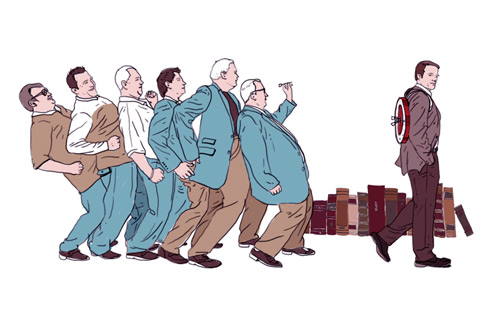Three laws of criticism
Criticism is good. A useful act of criticism is to help people improve what they are responsible for. The designer is told “the interface is inconvenient”, he improves it, and a user-friendly interface is obtained. The writer is told “you have a typo”, he corrects it, now there is no typo. Criticism makes the world a better place.
But there is a problem: sometimes criticism is hard to take because it is framed as a personal insult. Such criticism does not achieve a useful effect, because of it relations and reputation deteriorate.
To achieve good, maintain relationships, and not ruin your reputation, follow the three laws of criticism.
THE FIRST LAW OF CRITICISM. DON'T LIKE - CRITIATE
Criticize anything you don't like, regardless of whether someone else criticized it or whether you believe in the effectiveness of criticism.
- Button in Internet Banking does not work - wrote to technical support;
- Poorly worded text on the site - wrote to the author;
- The asphalt in the yard is bad - wrote in the city portal.
If you are being ignored for an important problem, feel free to turn on the "client from hell" and make the brain responsible. It so happened that dispatchers, designers, presidents, programmers, writers and in general all of us every now and then score on those who do not defend their position. If a single person reported a problem, there is no problem. But if a hundred people endure the brain with this problem every day, we will find a way to solve it.
Don't expect the problem to go away on its own. Do not expect that someone else will tell you about the problem for you. If you don't like it, criticize it.
SECOND LAW OF CRITICISM. CRITICAL - JUSTIFY
For criticism to be useful, you need to explain what exactly you do not like and why it is bad:
- The button is pressed, but nothing happens. SMS does not come, I can not pay;
- It is not clear from the text what to do after the notification arrives. I didn't do anything and the payment didn't go through;
The asphalt in the yard was poorly laid: continuous holes. It is inconvenient to travel by car, but impossible by bicycle.
Always criticize a job, never criticize a person. Don't try to imply that the person in charge is incompetent. This is not how it is:
- Do you use your Internet bank yourself?
- Have you hired students to write this text?
- What, they sawed everything, and there wasn't enough for the asphalt? Just for the sake of interest, go to our courtyard, see what conditions your voters live in.
Such criticism does not lead to anything, because from the outside it looks arrogant. Since a living person perceives criticism, he will not want to respond to such criticism. Imagine, on your site they write: "What kind of cretin did this site?"
Criticism is hard to take: it means that the person in charge has done a poor job. Don't exacerbate this with arrogant comments. You criticize - justify.
THIRD LAW OF CRITICISM. IF YOU KNOW - OFFERS
A good designer sees bad design around him and knows how to improve it. The same goes for the writer and developer:
- The designer, unlike the average user, knows Fitts's Law and that the interface is evil. A designer might suggest an improvement that the average user doesn't know about;
The editor is well-read, studies international experience and understands how to properly compose public announcements. He will make a much more persuasive ad than an ordinary official or city dweller;
The developer knows how to optimize animation and knows what 60 FPS is. Where the user sins on a slow computer, the developer is already optimizing the animation.
If you know how to improve what you are dissatisfied with, suggest an improvement. It doesn't matter whether it is correct or not, whether it is implemented or not, whether you take into account some subtleties or not. If you know, offer it.

